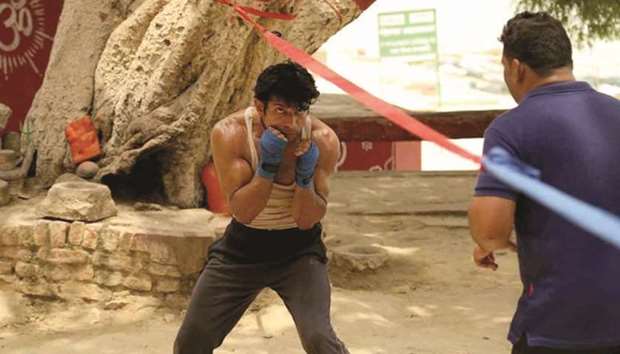Screened at the recent Toronto International Film Festival, Mukkabaaz begins with “gau rakshaks” or cow vigilantes beating up whom they feel are guilty of eating beef or slaughtering cows. Despite Indian Prime Minister Narendra Modi’s directive not to kill or hurt men in the name of saving the cow, groups of vigilantes continue to be on their murderous sprees.
Kashyap would return to “gau rakshaks’’ once again in Mukkabaaz if only to state that often protection for the cow is an excuse to fulfil personal agendas. Here, we see how a boxing coach played with disarming ease by Ravi Kishan, and his young pupil, Shravan (Vineet Kumar Singh), are brutally beaten by a small army of men because beef is found (rather planted) in the older man’s home. It of course turns out that both the coach and Shravan – training to be a champion boxer – come from lower caste Hindu families, a fact that Jimmy Shergill’s Bhagwan Das, a Brahmin (at the top of India’s social order), heading the boxing federation in the town of Bareilly, abhors.
A gangster, Das does not flinch even as he breaks his elder brother’s legs and keeps his mute daughter, Sunaina (Zoya Hussain), sedated and imprisoned in a remote and ramshackle building to make sure that she does not marry Shravan, whom she is in love with. Das hates Shravan also because he is gutsy enough to be defiant.
Said to be based on a true story, Mukkabaaz weaves into its plot of romance and personal greed (Das wants Sunaina to marry a man of his choice, because that will make him financially richer, an agenda that does not even stop him from marring Shravan’s prospects in the boxing ring) some of India’s most pressing social evils – which do not seem to go away, despite an increasing number of educated men and women who care little for caste or creed.
This is certainly where Kashyap scores, despite some of the exaggerations we are unfortunately fed. Das’ character appears so unidimensional that he begins to resemble a robotic rogue with absolutely no trace of regret or remorse. And the love story often intrudes into the main narrative – of how caste divisions create their own monsters, which destroy the lives of some only because some others find issues like cow protection handy to promote their own personal gains. Das takes refuge under beef ban and his own caste supremacy to lard over Shravan and his coach. Kashyap certainly brings out the arrogance of upper castes in India through the evil designs of Das.
But maybe, if the director had kept the romance between Shravan and Sunaina under a tighter leash and not peppered his work with so many distracting songs, the cores issues which Mukkabaaz seeks to batter us with as the film begins to unroll, could have been far more effective.
Kashyap has the potential to stop himself from falling into a pit of this kind – a bane of Indian cinema which in the name of entertainment thrusts into our faces the silliest of stuff.
Kamal-Rajinikanth rivalry
The recent rivalry between two Tamil superstars, Kamal Haasan and Rajinikanth reminded me of a similar one in the Kolkata of 1965. Bengal’s iconic Satyajit Ray chose The Statesman to lambast a fellow auteur, another great luminary, Mrinal Sen. Ray tore apart Sen’s newly released Aakash Kusum, and the newspaper’s letters to the editor column was used to convey this criticism. One of the points raised by Ray was the topicality of the storyline. The debate between the two stalwarts in The Statesman became so heated that the editor had to intervene.
History seems to be repeating in Tamil Nadu with Haasan and Rajinikanth throwing darts at each other. They chose an October 1 function, organised on the banks of the Adyar River to unveil a statue of the late Tamil actor, Sivaji Ganesan.
In what seemed like a barbed dig at Haasan – who is reportedly choreographing his entry into the political arena – Rajinikanth said that “one needs something beyond celebrity status to succeed in politics”. And Rajinikanth cited the example of Ganesan, who despite being recognised as an actor par excellence failed to make a mark in politics.
So, Rajinikanth averred: “A legend of our times, Sivaji Ganesan has left us a lesson not just in cinema, but also in politics. He launched his own political party and lost elections, including from his own constituency. This was not an insult to him, but the people of that constituency. So, the message is that fame and clout (earned in cinema) are not enough to succeed in politics. There should be something beyond that. I don’t know what it is. But I think Kamal Haasan would know and even if he knows the secret, he would not tell me. Maybe he would have told me if I had asked him two months ago”.
Rajinikanth, who rose from being a bus conductor in Bengaluru to one of the most successful box-office clinchers, was referring to Haasan’s heavily loaded political statement in July urging the people of Tamil Nadu to send their grievances about political corruption and ineptitude to the governor.
Rajinikanth’s October 1 missile aimed at Haasan is seen as a tit-for-tat move against Kamal’s indirect dig at the superstar during the recent 75th anniversary celebrations of Murasoli, the mouthpiece of the Dravida Munnetra Kazhagam (DMK), a political party headed by Karunanidhi. Haasan had quipped then: “Self-respect is more important than self-protection”. This appeared to be a reference to Rajinikanth’s refusal to share the dais with DMK leaders. Instead, the star sat with the audience.
* Gautaman Bhaskaran has been
writing on Indian and world cinema
for close to 40 years, and may be
e-mailed at [email protected]
writing on Indian and world cinema
for close to 40 years, and may be
e-mailed at [email protected]

